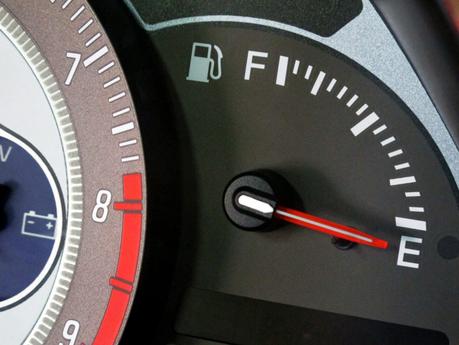
As my car entered our neighborhood, I took my foot off the gas pedal and coasted down the gentle slope. If I coasted just 1,000 feet (300 m), I could turn right onto my street without ever hitting the gas pedal. If I was lucky, no one else would be coming, and with a little careful steering, I could continue to coast into the lower portion of our driveway and into the garage.
As I navigated, I watched the gas gauge display that calculates how many miles per gallon the car is getting in real time. In other words, when you coast, you aren't using gas and the gauge reports that you are getting 50 + miles to the gallon. Accelerate, and your performance drops to less than 12 miles per gallon. Watching that gauge had become similar to playing a video game! I would coast on the hills to increase my average miles per gallon (mpg) and maximize my fuel economy.
As I kept my eye on the gauge, it didn't take long to figure out that while the fuel tank didn't change, there were multiple variables that impacted the gas mileage efficiency. For example, my husband drives differently than I and that was reflected in the average mileage reported when he drove versus the average mileage when I drove. Fuel economy was generally better on longer trips at steady speeds rather than on short bursts around town or while idling in car lines. Acceleration, deceleration, weight in the car, etc. all seemed to impact my fuel economy.
To some extent, I reckon that the way my car uses fuel might be similar to the way my body uses fuel. There are some days that I might use more calories and some days I certainly use less. Age, gender (hormones especially), stress, activity level, etc. can all impact metabolic rates - which is, in essence, our fuel economy.
Moreover, as we now know from research, all calories are not created equal. A calorie of fat (9 calories per gram of fat) and a calorie of carbohydrate (4 calories per gram of carbohydrate) are treated differently by the body. Carbohydrate gets burned pretty quickly and triggers a different balance of hormones to process (metabolize) it than does the fat or protein. It's the process and hormones that your body uses to metabolize food that matters most. Some of us have dysregulated or dysfunctional responses to carbohydrates. In some ways, carbohydrate is like a food allergy for me in that my body simply does not process carbohydrate efficiently.
How do you calculate your metabolism?
So, if I want to lose weight, how am I going to account for all of those variables that I can't measure or quantify?
Unlike my car, I don't have a fancy pants gauge to calculate my metabolism, my CMM (calories per minute) at any given time. Or do I? Maybe I've always had a gauge and over time the "noise" from the metabolic dysregulation and the obesity and the insulin resistance kept me from being able to properly read and understand the gauge. That gauge is hunger. Before going low carb high fat, my body was so challenged that I couldn't rely on the gauge. The gauge was always stuck on empty even though the tanks (fat cells) were full.
Eating low carb high fat allows me to trust me gauge. It has taken me years to learn to trust it. At first there was a lot of "head noise" in identifying hunger because I had horrible eating habits, including eating from boredom and out of habit. In many ways, food was one of my few pleasures.
While I used food as a psychological crutch, there was also a physiological basis for my hunger.
Taubes, Attia, Phinney and Volek all describe obesity as a condition where our body can't access the fat (fuel), and so we are always hungry. I call it knee deep in the river and dying of thirst. When we eat low carb high fat consistently, blood sugar should be stable and insulin levels are likely to normalize over time. It is then that our bodies can access the fuel and the gauge becomes more reliable.
When I was new to low carb high fat, I remember the incredible feeling of finally being not hungry. In the first few days of low carb high fat, I was NOT hungry. I did not wake hungry nor did I go to bed hungry. For the first time in my life I forgot to eat. I was being fed from my stored fuel (fat reserves). It felt as if I was in someone else's body. I wondered, "Is this how 'normal' people feel?"
I know that there are foods and ingredients that make my gauge not work well.
Over four years later, I know that there are foods and ingredients that make my gauge not work well. I'm still learning about some of them, but I know for certain that eating carbohydrates distort my gauge; diet soft drinks interfere with my overall CPM; coffee that I love and adore impacts my calibration; and stress impacts my gauge.An important part of this journey, is being able to read your own gauge, which begins with putting in the best fuel (food) you can. For me, that's low carb high fat. It also means avoiding ingredients that interfere with my gauge even when I crave those foods!
Hunger, once you can trust it, is an excellent gauge. The way to trust hunger is to eliminate or manage the foods and ingredients that interfere with the gauge. Calibrating the system has taken time and tenacity, but it has saved my life.

